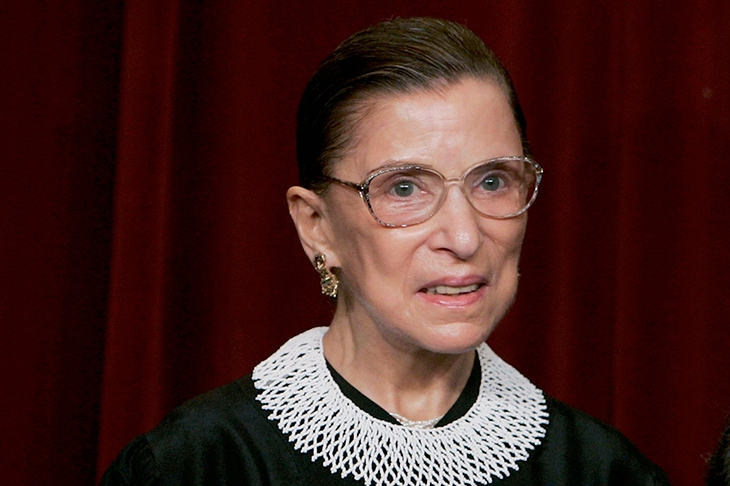Within hours of Supreme Court Justice Ruth Bader Ginsburg’s death, Democrats and Republicans began fighting over how to fill her seat — and when. The stakes are high because the Supreme Court is so important. It can invalidate any federal, state or local law by ruling that it violates the US Constitution. And its decisions set precedents that lower courts must follow. Its rulings are final, made by judges with lifetime appointments.
Donald Trump intends to fill Ginsburg’s seat as quickly as possible. He will announce his nominee by the end of the week. That nominee will then face hearings before the Senate Judiciary Committee, chaired by the Republican Lindsey Graham. Once a nominee gets through the committee, the full Senate debates his or her case. Given recent history, and the looming presidential election, it’s hard to exaggerate just how contentious this process will be.
These days, nominees need only a simple majority. Until 2013, all judges needed 60 Senate votes, known as a ‘-supermajority’. The Democrats, who led the Senate then, changed the rules to pass President Obama’s federal court and other nominees. It was a consequential move — and short–sighted. The ‘nuclear option’, as the change was called, blew up long-standing arrangements. Once the president no longer -needed a super-majority, he could choose more extreme nominees as long as his party controlled the Senate and the moderates didn’t defect. Initially, the change did not include votes for Supreme Court nominees, but that was altered after the death of conservative icon Antonin Scalia in February 2016. By then, the Democrats had lost their -majority, and Republicans blocked Obama’s effort to fill Scalia’s seat. That refusal hangs over today’s vacancy, four years later.

After Scalia’s death, Obama nominated the highly qualified Merrick Garland. But Republicans balked. It was Obama’s final year and they thought: ‘Why not wait for a new president? Sure, Trump is a long shot, but he could win.’ They trotted out high-minded arguments about letting the people decide. In fact, Republicans made a hard-nosed calculation of political advantage.
Today, almost all those Republicans have reversed their positions. What about the Democrats? Same thing. It’s worth remembering that in 2016 Justice Ginsburg urged an immediate vote on Garland. In 2020, her dying wish was to wait for a new president. This point is not that these people are hypocrites; of course they are. The point is that even Supreme Court Justices are political actors, and care a lot more about winning the Supreme Court than about consistency.
Democrats are still bitter about the Garland episode, believing the seat was ‘stolen’ from them. They repeated that charge when Trump and a Republican Senate filled the seat with Neil Gorsuch, a solid conservative, extending the ‘nuclear option’ to a Supreme Court pick for the first time.
Democrats complained again when Justice Anthony Kennedy retired, and Trump got a second opportunity to fill a Court seat. Although Kennedy was a Republican, he was a moderate and often a swing vote on the Court. His replacement, Brett Kavanaugh, was a more reliable conservative. Nominated partly because of his spotless reputation, he was approved only after a brutal battle. It reached a low point with rumours that he had sexually assaulted a woman in high school. No one had mentioned the allegation when he was investigated for appellate court, and the FBI could have quietly looked into it. Instead, the top Democrat on the Judiciary Committee, Dianne Feinstein, kept the charges secret until Kavanaugh was about to be confirmed. She then released them and demanded an exhaustive investigation. The media covered it breathlessly. Leading Democrats abandoned the presumption of innocence, said ‘all women should be believed’, and insisted Kavanaugh withdraw. Instead, he faced down the charges in public session. Although the assault supposedly happened at a crowded party, nobody came forward to support the allegation and several refuted it. He was confirmed, narrowly.
The prospect of another gutter fight looms over the latest vacancy. Both parties are ready for it
The prospect of another gutter fight looms over the latest vacancy. Both parties are ready for it, but Democrats remember how unhappy voters were with their over-the-top attacks on Kavanaugh.
The Republican party holds 53 Senate seats, so can afford to lose only three votes. (Vice President Pence breaks a 50-50 tie.) Their caucus has a few moderates and others who face tough races in ‘purple’ states with centrist voters. But Senator Mitt Romney, a leading anti-Trump Republican, has already come out in support of a vote on Trump’s nominee. Trump and the Senate majority leader Mitch McConnell think they can win — and Trump thinks the fight helps his re-election bid: one reason he’s keen to move quickly.
But Democrats are hitting back hard, saying ‘everything is on the table’ if Trump pushes through his nominee. That’s a threat. To fulfil it, the Democrats need to capture the White House and Senate next month. If they do, they could remove the Senate’s remaining barriers, which allow the minority to block legislation with 40 votes. With that restraint gone, they could pass their entire agenda on taxes, immigration, green energy and more. They could admit new reliably Democratic states — such as -Puerto Rico, for example — to the Union to lock in their Senate majority, and add extra judges to the Supreme Court. The Court has had nine justices since 1869, but there is no fixed constitutional limit.
Democrats threatened to pack the Court in 1937, after Justices struck down much of Franklin Roosevelt’s New Deal legislation. The threat was enough to force the Court to change direction immediately. Its new rulings opened the gates to a much larger, more active central government and a sprawling Washington bureaucracy.
Threats from Democrats don’t intimidate Trump and McConnell. They are going forward with a conservative nominee. If Biden wins and his party takes the Senate, they will have to decide whether to knock down the barriers, ram through their wish list and stack the Supreme Court. The stakes couldn’t be higher.
Charles Lipson is the Peter B. Ritzma Professor of Political Science Emeritus at the University of Chicago.





Comments